Schools2030 Tanzania
Catalysing teacher-led innovation in Dar es Salaam, Lindi and Zanzibar
In Tanzania, participation in the Schools2030 programme is demand-driven – each year, the Schools2030 team advertises three new design challenges (one per age group) for teachers and youth partners to opt in should they wish to.
Each design team has between four to six teachers, who can be from the same or from different schools. The design teams are self-formed during the application, or assigned by Schools2030 staff from individual applicants based on their context. The teachers, with the support of design coaches, have regular check-ins to facilitate reflection and iteration of their innovations.
Each year, the design challenges are co-created with teachers and other education partners – examples include increasing parental involvement in education, building climate resilience or tackling inclusion issues. The challenges are informed by data from contextually relevant assessments and exploration of the lived experiences of teachers, learners, parents and others. Watch the video to learn more about what some of these innovations look like in practice!
At the end of the design cycle, the Schools2030 Innovation Evaluation Tool is used to select ‘promising’ innovations, which will go onto further incubation and testing in other classrooms. Read more about the tool on our Innovate page, and view the Teachers’ Design Journey Roadmap for Schools2030 East Africa to learn more.
Our Team in TANZANIA
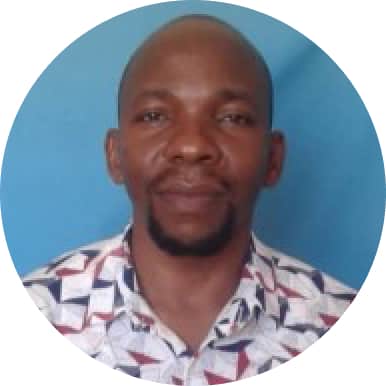
Shaibu Mandova Athumani
Schools2030 National Coordinator
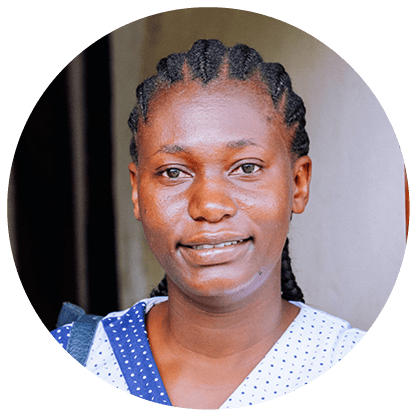
Gega Bujeje
Project Officer, Education
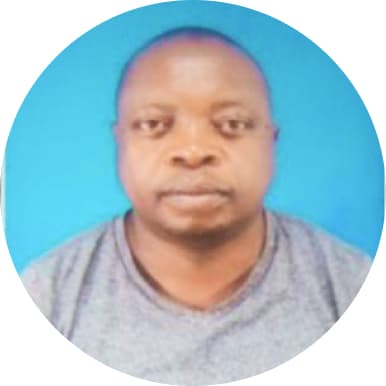
Mapunda Kawanga
Education Improvement Programme (EIP) Manager
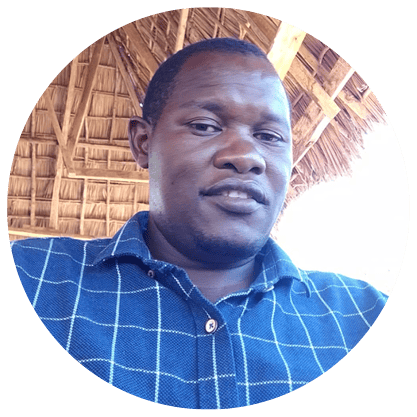
Kaliba Songo
Monitoring and Evaluation Officer
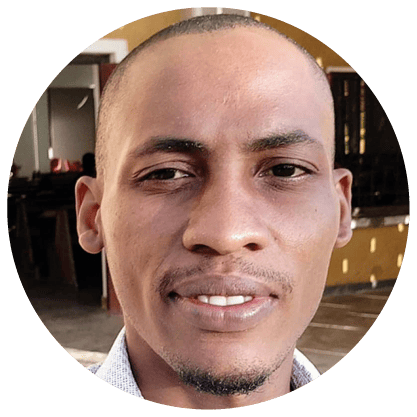
Venance Matei
Project Officer, Education

Emily Tusiime
Regional Assessment Coordinator

Rupert Corbishley
Regional Education Advisor
The Tanzanian Education Context
Tanzania is an East African country famous for its wildlife reserves, tropical coastline and Mount Kilmanjaro. Tanzania is a pluralistic and diverse country, home to over 100 ethnic groups and languages.
Show More
Tanzania’s education system has for several years been directed by the Education Sector Development Plan (ESDP) (2016/17 – 2020/21). The ESDP sets out a series of priorities, in particular, a commitment to providing twelve years of free and compulsory Basic Education and progressive expansion of Technical and Vocational Education and Training to provide Tanzania with an enhanced pool of skilled human resources. The ESDP also focuses on ensuring equitable access to education and training for all, including the most disadvantaged and enhanced effort on improving the quality of education at all levels.
In 2019, Tanzania recorded a total of 11.2 million pupils enrolled in primary and secondary education. Of these pupils, about 9.3 million (83%) were in primary education. Total enrolment in secondary schools was 2.3 million.
The Tanzanian Education Context
Tanzania is an East African country famous for its wildlife reserves, tropical coastline and Mount Kilmanjaro. Tanzania is a pluralistic and diverse country, home to over 100 ethnic groups and languages.
Tanzania’s education system has for several years been directed by the Education Sector Development Plan (ESDP) (2016/17 – 2020/21). The ESDP sets out a series of priorities, in particular, a commitment to providing twelve years of free and compulsory Basic Education and progressive expansion of Technical and Vocational Education and Training to provide Tanzania with an enhanced pool of skilled human resources. The ESDP also focuses on ensuring equitable access to education and training for all, including the most disadvantaged and enhanced effort on improving the quality of education at all levels.
In 2019, Tanzania recorded a total of 11.2 million pupils enrolled in primary and secondary education. Of these pupils, about 9.3 million (83%) were in primary education. Total enrolment in secondary schools was 2.3 million.
THE THREE-STEP MODEL IN TANZANIA
Assess
Priority Learning Domains
TANZANIA
Tanzania was the first Schools2030 country to determine their five focal domains in early 2021. As with every country, this was done alongside multiple stakeholders and the National Advisory Committee who could advise on curricular educational priorities. The Tanzania team were then able to provide valuable feedback to the other teams
Based on the domains, the team were also able to develop the first suite of rapid assessment tools with Schools2030’s Global Assessment Partner, Oxford MeasurEd and support from Emily Tusiime, AKF East Africa’s Regional Assessment Advisor. These tools comprised a set of teacher reflection and observation exercises, to inform qualitative assessments of non-academic proficiencies. The team have also successfully adapted Save the Children’s International Development and Early Learning Assessment (IDELA) tool (with support from Save) for the pre-primary age group, available below. The ISELA tool will follow soon.
PRE-SCHOOL
- Literacy
- Numeracy
- Health & Nutrition
- Creativity
- Relationship Building
PRIMARY SCHOOL
- Literacy
- Numeracy
- Creativity
- Problem-Solving
- Self Awareness
SECONDARY SCHOOL
- Literacy
- Numeracy
- Arts & Culture
- Critical Thinking
- Civic Engagement
Access examples of assessment tools
from across our programme countries.
All these tools are available free to download below and will continue to be refined and iterated to ensure robust psychometric validity.
SEEING MY GEOGRAPHY LESSONS COME ALIVE THROUGH PRACTICAL ACTIVITIES HAS BEEN A GAMECHANGER. I NEVER IMAGINED GEOGRAPHY COULD BE THIS HANDS-ON AND IMPACTFUL.
Stanley Melo, Geography Teacher, Charambe Secondary School, Tanzania
Innovate
Over 200 teachers and youth partners have undertaken HCD training in three two-day sprints that captured the ten phases of the process. Innovations from these 100 learning sites were designed which reflected the challenges identified through the assessments and these are now being implemented at school-level where their efficacy for improving student outcomes will be tracked and evaluated.
Although the majority of innovations designed focus on core academic competencies such as literacy and numeracy, all of them also incorporated social-emotional and 21st century skill development such as critical thinking, civic engagement, communication and problem-solving. All were designed for learner-centredness and have strong components of playful and participatory learning – see below for some examples. There are early signs that these innovations are proving effective – teachers have observed that after only a few months of implementation, students’ attention, interaction, and confidence seemed to be increasing.
Any innovations that are proven to be successful will be considered for incubation and sacle, as well as implemented into AKF’s wider education programmes in the area, including the Foundations for Learning (F4L) programme, which spans the East Africa region.
Schools2030 in Zanzibar is piloting AKF’s new initiative Play, Pluralism and the Planet. PPP will leverage the Three-Step Model (Assess, Innovate, Showcase) to catalyse new teacher-driven solutions for the climate. The pilot will incubate school-led innovations around some of the subjects taught in secondary school such as micro-forestry, rainwater harvesting or soil factory. This will be supported by AKF experts in climate and environment. Innovations with proven success can then be scaled initially to mainland Tanzania and beyond.
Showcase
Schools2030 Tanzania celebrates the completion of teachers’ HCD journeys through a series of showcases that highlight the innovations they have developed. These events shine a light on ‘what works’ in terms of improving outcomes as well as instances of positive deviance in practice. At the events, innovations are evaluated for efficacy, inclusivity, feasibility, and sustainability, and their impact on teaching and learning is shared with other stakeholders. Showcasing events also create valuable opportunities for networking among teachers, government representatives, CSOs, and other education stakeholders, while strengthening project visibility and securing government buy-in for scaling and sustainability.
Showcasing takes place at multiple levels each year, beginning with district preparatory workshops (Temeke, Lindi, and sometimes Zanzibar) where teachers refine and pitch their innovations. Local showcases then bring together schools, CSOs, LGAs, and national advisory members, with innovations meeting 75% of evaluation criteria advancing to the National Showcase. This flagship event is often integrated into larger platforms such as TENMET’s International Quality Education Conference, featuring presentations, exhibitions, role plays, performances, and reflection sessions. Alongside Schools2030’s 5–7 annual showcases, innovations are also promoted through external opportunities such as conferences, regional dialogues, and education partner events, ensuring teachers’ ideas gain visibility and recognition both nationally and internationally.
Tanzania was also the first Schools2030 country to host the Schools2030 Global Forum in 2022, which set a new global standard for convening education conferences alongside educators themselves.
News and stories from Tanzania
IMPACT AND LEARNING
Tanzania
We regularly produce learning and research reports that inform and strengthen our programme delivery. Read and share our latest learnings for Tanzania or click below to browse all our reports.

Research Report - Tanzania

Data Must Speak Zanzibar
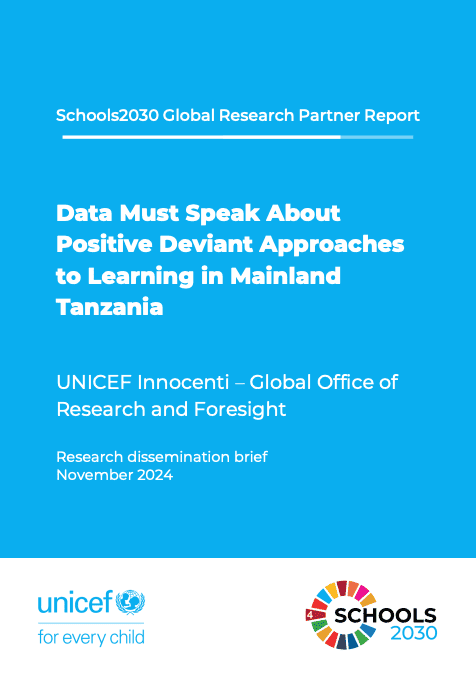
Data Must Speak Mainland Tanzania
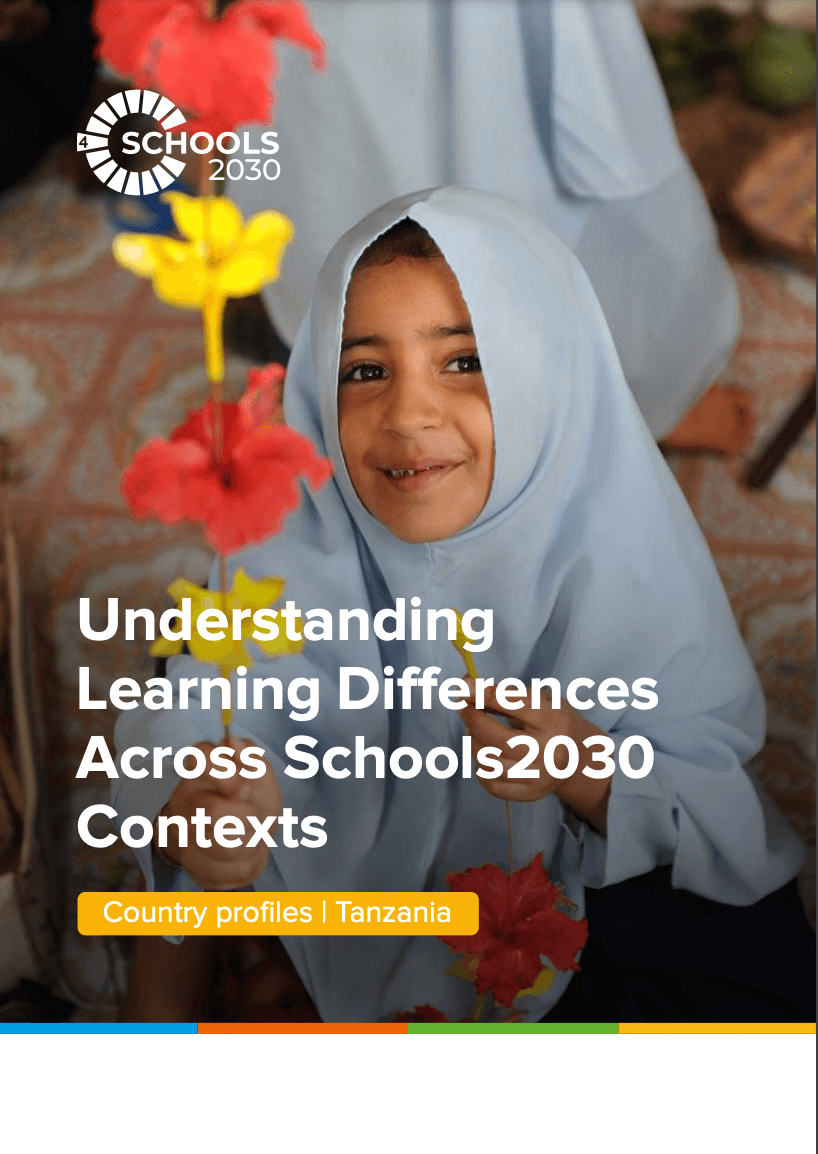
Learning Differences - Tanzania
OUR TANZANIAN PARTNERS
National Advisory Committee
The National Advisory Committee (NAC) provides strategic guidance, helps to amplify the work of teachers nationally and ensures that the Schools2030 programme in aligns to governmental education priorities. Representatives from the following organisations comprise the NAC in Tanzania.
President’s Office, Regional Administration and Local Government (PO-RALG)
Ministry of Education, Science and Technology (MoEST)
Tanzania Institute of Education (TIE)
Aga Khan University, Institute for Education Development (AKU – IED)
Swedish International Development Agency (SIDA)
Children In Crossfire (CIC)
Mwananchi Communication Limited
BRAC International
Tanzania Early Childhood Development Network (TECDEN)
Madrasa Early Childhood Development Zanzibar (MECPZ)
Tanzania Eduaction Network (TEN/MET)
Shule Direct
Organisation for Community Development (OCODE)
AKFEA
AKFT
Country Assessment Partners and Learning Partners
In-country Assessment Partners initially supported the development of Schools2030 assessment tools and offer ongoing guidance for teachers in using them. Learning partners in each country track and measure the efficacy of the innovations and teacher professional development, and produce yearly reports with recommendations for how to make the programme stronger. Find out more about how our global and national partnerships work on our Coalition page.
Explore Schools2030 in our other countries.








